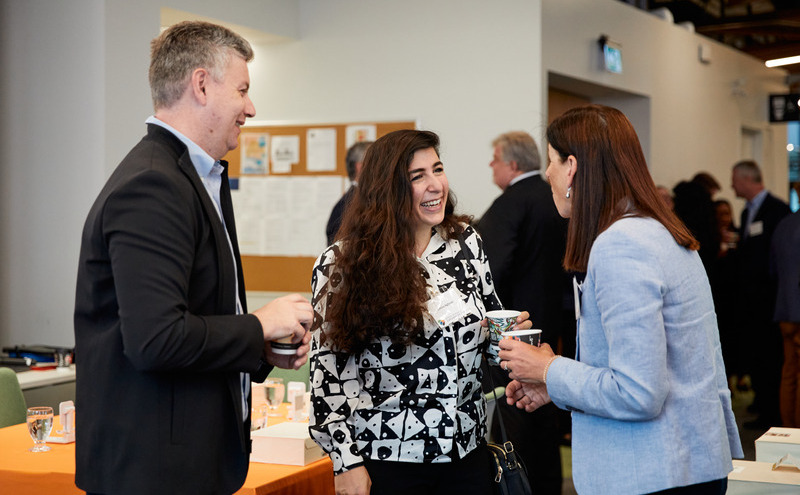Explore the ways you can work with CapU students to advance your projects and give back to local students.

Working with CapU students is a cost-effective way to tap into the next generation of talent and a practical opportunity for an employer to evaluate a potential long-term employee before hiring.
Many organizations choose to hire back co-op students after graduation, and some community partners adopt and implement suggestions from students who participated in applied research projects.
By supporting students in their learning journey, you enhance brand awareness, advance corporate reputation and generate goodwill for the organization.
Work with CapU Students
Short-term projects
An applied research project is often called a capstone or consulting project, where students solve organizational challenges proposed by the client with the guidance of an instructor.
Since the project is embedded into the course and presented as a class assignment, there is no payment attached to employers, and they could benefit from receiving deliverables within a promised timeframe (usually within 2-8 weeks).
If you are a community-based organization, you can recruit students to solve community challenges. For example: In GEOG 330 - Water Changes Everything, students worked on promoting public awareness of the water systems in the City of North Vancouver and the importance of making sustainable choices when disposing of wastewater.
A field placement allows students to explore career interests in kinesiology, rehabilitation, health sciences, coaching, health promotion, fitness and health in special populations, etc., while identifying and cultivating skills associated with the tasks presented in their placements.
Courses and programs with field placement options include Kinesiology (KINE 397) and Rehabilitation Assistant (RADP 190).
A work experience term is one or two terms of full-time paid work during an academic program, where students get experience relevant to their program and career goals. Additionally, CapU students have the flexibility to end their program on a work term, which means the hosting organization could offer the successful candidate a permanent role right after completing the work experience term.
Courses and programs with work experience options include BADM 345 Business Work Experience I and BADM 445 Business Work Experience II.
Longer-term projects
A co-op consists of alternating academic terms and work terms in a temporarily full-time workplace related to a student’s field of study (ACEWIL). Through Co-op, students translate classroom theory into a professional work setting while gaining on-the-job experience, building a professional network, and clarifying career goals.
As per B.C. Labour laws, students who participate in a Co-op as their form of Work-Integrated Learning are paid at least the provincial minimum wage (gov.bc.ca, 2022).
The co-op work term is a mandatory part of the Tourism Management Co-operative Education diploma and the Bachelor of Tourism Management degree.
Internship typically involves a single, discipline-specific, supervised, and structured work experience placement. Internship may occur in the middle of an academic program and/or after all academic coursework has been completed, but prior to graduation. (ACEWIL)
The Business Internship experiences (BADM 340, BADM 440) are designed to provide a period (120 hours) of part-time, productive employment, which may be paid or unpaid within industry, non-profit organizations or government.
Practicums and clinical placements are designed for students to practice specific skills related to a profession in either a paid or unpaid capacity.
Courses and programs with practicum or clinical placement options include Applied Behavior Analysis (Autism), Arts and Entertainment Management, Design in Visual Communication, Early Childhood Education, Education Assistant, Global Hospitality & Tourism Management, Health Care Assistant, Legal Studies, Motion Picture Arts, Music Therapy, Rehabilitation Assistant, Tourism Management International, and more.
A post-credential internship happens after coursework and before graduation. Internships can be of any length, but are typically four, eight, or 12 months long.
Co-curricular CSL happens outside of class. It gives students the opportunity to help their communities and a chance to reflect.
Volunteering builds skills while helping businesses that may not be able to afford full-time employees.
If you’re looking for a way to give back, you can help students with short-term work experience such as job shadowing. This gives students the chance to see how different companies operate and build their network.

Find out how to work with CapU students
CapU students across all programs are ready to apply their skills and training to your projects. Get in touch today.
Talk to UsOther opportunities to meet and work with our students
As well as practical learning opportunities, there are other ways you can work with Capilano University students.
Our Career Development Centre regularly hosts events for employers. You can attend hiring fairs and information sessions and present your business to students. You can also participate by offering company tours, or by offering job shadowing or mentorship programs. We also work with employers for panel events and guest speaking.
Find out more about these opportunities by contacting the Career Development Centre at cdc@capilanou.ca or 604 984 4965.
Work with tourism management students
If you’re specifically interested in working with tourism management students as part of their co-op diploma, we have specific information for employers.

How it works
Read through the process of working with students at CapU including when to reach out to our team and how much time you’ll need.
Learn about the process